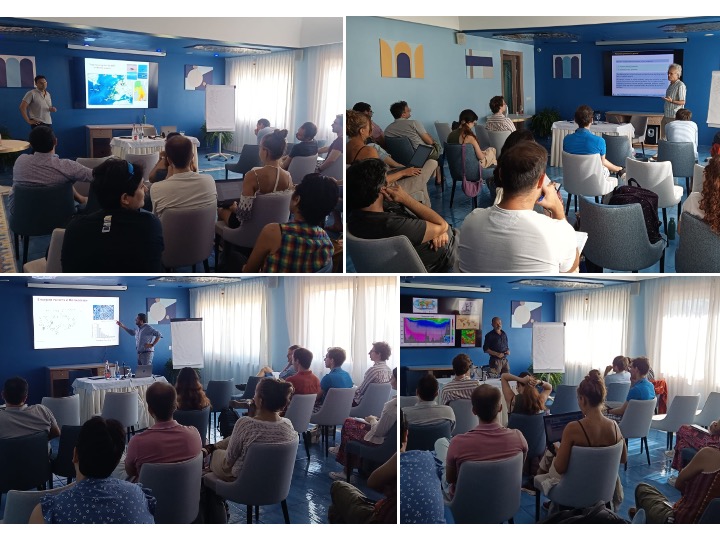The Synergy Summer School was designed, organised and sponsored by three major projects co-funded by the EU: AtlantECO, BIOcean5D and Mission Atlantic, together with the support of the Marine Training Unit of EMBRC-ERIC hosted at Ghent University (UGent). “The collaborative development of the school enabled the synergistic combination of multiple different aspects of ocean science,” explains Damien Eveillard, leader of the work on eco-evolutionary mechanisms in holobionts within BIOcean5D and professor at Nantes University. “The school thus provides the theoretical basis for the truly modern, multidisciplinary approach needed to understand marine ecosystems,” continues Daniele Iudicone, AtlantECO coordinator and researcher at the Stazione Zoologica Anton Dohrn. “In addition to each individual discipline, the students also gain unique knowledge at the interface of these different topics,” adds Patrizio Mariani, Mission Atlantic coordinator and professor at the Technical University of Denmark (DTU Aqua).
The Synergy Summer School thus contributes to the development and training of a cohort of scientists with not only the strong cross-disciplinary expertise needed to form an integrated understanding of marine ecosystems, but also with the instinct and ability to consider an issue from multiple perspectives.
 Lectures were given by researchers and scientists from the three partner projects: AtlantECO, BIOcean5D and Mission Atlantic, enabling a diverse range of topics to be covered.
Lectures were given by researchers and scientists from the three partner projects: AtlantECO, BIOcean5D and Mission Atlantic, enabling a diverse range of topics to be covered.
Connecting diverse topics
The educational programme was defined and the lectures were given by researchers and scientists from the three partner projects. This collaborative approach enabled the range of topics included to be extended beyond the scope of any individual project: complex systems, adaptive dynamics, omics methods, new modelling frameworks, ocean connectivity, behavioural ecology, ecosystem theory, big data analytics, ecosystem assessment and management, new observation technology, and more!
“Our main idea was to present the concepts, models and major insights of multiple fields to develop common ground and understanding across the diverse disciplines of ocean science,” explains Eveillard. “These disciplines are often developed in isolation,” continues Mariani. “The collaborative nature of the Synergy Summer School enabled the topics to be connected, bridged and the resulting multidisciplinary knowledge to be shared.” The combination of interesting lectures, brainstorming sessions and informal discussions supported cross-fertilisation between topics, leading to the development of new ideas and the creation of invaluable connections between scientists from diverse disciplines.
In this respect, the lectures on ocean connectivity were particularly successful. “These lectures generated fascinating discussions about the link between ocean physics (transport by currents) and ocean biodiversity patterns. There is potential for research at this interface, especially as it’s a highly relevant subject for ocean sustainability and even more so since the signing of the High Seas Treaty / Biodiversity Beyond National Jurisdiction (BBJN),” explains Iudicone.
 The Synergy Summer School was held from 24 to 28 June 2024 in Ischia, Italy.
The Synergy Summer School was held from 24 to 28 June 2024 in Ischia, Italy.
From diversity to cross-fertilisation
The cumulative reach of AtlantECO, BIOcean5D, Mission Atlantic and EMBRC’s Marine Training Unit ensured the Synergy Summer School was attended by a highly diverse group of early career researchers: PhD students and postdoctoral researchers, from several European countries and from scientific fields that varied from theoretical physics to ecology and ecosystem conservation.
With very positive feedback received, it is hoped that the Synergy Summer School will become a regular event. “Maintaining the school’s momentum supports not only cross-fertilisation between disciplines but also the identification and development of new ideas, questions and conceptual frontiers,” explains Eveillard. The organisers have also identified some improvements to an already very successful format. “Due to the diversity of the student’s educational backgrounds, the core of the school is composed of stimulating lectures that cover both basic and more advanced topics, followed by informal discussions and collaborative projects. Sustainability and traceability were also taken into account and all training resources are available on EMBRC’s e-Learning Platform. In future editions, we’d like to explore a more blended training approach through the introduction of practical sessions to facilitate the assimilation of abstract concepts,” explains Iudicone. “As well as the involvement of even more projects and initiatives!” continues Mariani.